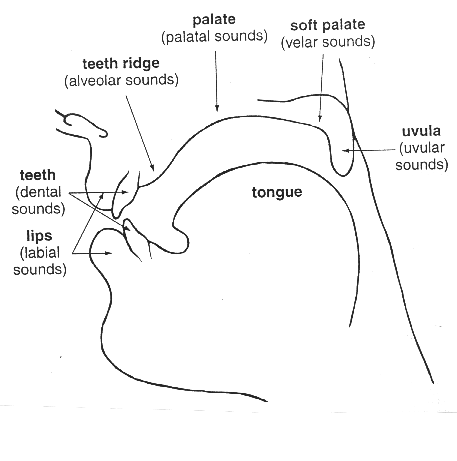"It is the function of art to renew our perception. What we are familiar with we cease to see. The writer shakes up the familiar scene, and, as if by magic, we see a new meaning in it." -Anais Nin
We're all used to trusting our senses for information about this world. And while there are certainly plenty of illusions that lead us astray, they almost always come up as tricks that our eyes play on us. Take a listen to the Jazz classic by Wes Montgomery,
You all know how to pronounce the different consonants, and how to make a plethora of different sounds with your mouth. For example, if you wanted to make the "B" sound, you'd purse your lips together, and burst them outwards at the moment you wanted to create that distinctive "B".

And you'd certainly never confuse that sound with an "F" sound, would you?
An "F" is entirely different, made by placing your lower lip against your upper teeth, and then pushing air out of your mouth while you're in that position. The "F" sound is unmistakeable, right?

Believe it or not, if you listen to the "B" sound while you watch someone's mouth go through the motions of an "F" sound, you will hear the "F"!
Not only will you hear the "F" sound, but you'll even hear it if you know it's coming. And it's coming. Try it. Watch the video below.
I've never seen a hearing illusion before, and this is a spectacular one. Hope you enjoy it, and a great weekend, too!


Bucking amazing...
(sorry, had to be done)
That is disquieting. I could hear the /b/ clearly all the way through, with my eyes closed. I am used to listening very carefully to recorded speech, usually police surveillance, and pride myself in being able to disentangle ambient noise and hearing subtle cues, but the best I could do in this situation is hearing a labiodental /b/ like sound, in effect an /f/ like sound, voiced almost like a /v/, but with a very strong expetation of the puff of air. At work (I am an interpreter) I change from closed eyed to open eyed to get rid of this, I guess. Even sometime when standing next to a witness, which makes the speaker wonder if I can *hear* them.
Oddly enough, I can't hear anything. I hear the "a" being pronounced, but, when the video plays a "b" while he mouths an "f", I can't hear the "b/f". I hear clearly when my eyes are closed though.
Oddly, this effect doesn't work for everyone. The last time a video like this went around, I found that neither my mother nor I experience it.
An excellent demonstration of how much lipreading aids in our comprehension of speech. This is one reason why hard of hearing individuals have a hard time thinking they really have a problem, and allows those that know they have a problem to try and compensate by learning to lip read.
It's also fascinating how our brain arbitrarily decides where one phoneme ends and the other begins, and how that interacts with the Mcgurk effect.
A big thumbs up from this nascent, audiology grad student!
You're amazing man!
Looks quite interesting.
i might just be her talking over it, but i heard 'ba' the entire time aside from a few 'va's
That's an interesting point, Seolyk. I wonder if the introduction of a second 'disembodied' voice forces the auditory brain to work harder and lessens the effect of the visual brain.
Here is an important point for science.
We don't objectively perceive the objective world out there.
Rather our inner thought processes are part of the perception process; meaning that our thought reflexes have been trained since infancy (or are hardwired) to interpret sense data in certain subjective (conflicting) ways.
Magicians of course are much better at seeing through illusions than scientists; because by training they are trying to trick the observing mind. By training they know that observation are never purely objective.
Even when there is no deliberate fraud or deceit involved; nature may give deceptive answers to experiment. Such deceptive information requires an act of insight (or creativity) to see beyond the ideas thoughts concepts which we have been trained (brainwashed) to see.
What is nature telling us in the recent CERN observation regarding neutrinos travelling faster than the speed of light? What hidden assumption are we ignoring as not important? Or is the speed of light somehow variable?
Of course, brainwash is too strong a term.
But when everyone has been trained to believe in a flat world, or classical determinism, or c the speed of light (or some other assumption); it is a rare act of insight to imagine "reality" differently than we are perceiving.
"Rather our inner thought processes are part of the perception process; meaning that our thought reflexes have been trained since infancy (or are hardwired) to interpret sense data in certain subjective (conflicting) ways."
Hence science uses skepticism and peer review amongst their peers to weed out bad ideas.
It is also why citation is an important metric: bad ideas don't produce any "offspring" and never get widely cited, since it never helps.
"Even when there is no deliberate fraud or deceit involved; nature may give deceptive answers to experiment."
Nature doesn't give a monkeys for use, so can't commit deceit and unable to manage fraud.
What those who don't really care about the science will do may be fraud or deceit, but there's generally a (bad) reason for it, even if they deny it.
But science doesn't give deceptive answers to an experiment.
Media reporters, who want to sell a headline, may.
Wow @10
Yes, yes; but you've missed or misunderstood my point.
Perhaps a clearer expression of my meaning is given by Nobel Prize physicist Robert B. Laughlin. "in the world we actually inhabit, dark laws abound, and they destroy predictive power by exacerbating errors and making measured quantities wildly sensitive to uncontrollable external factors." from A Different Universe, pg 209-210
For an overall discussion of my point, David Bohm's book, Thought As A System, is excellent.
"Who you gonna believe, me or your lying eyes?"
It's interesting to see that illusions work visually as well as sight combined with hearing. When I listened, i saw that i too heard the "f" sound and i still can't understand why. I knew before hand that I would be under the influence of a different sound and still I couldn't resist the the "f". Does this happen daily to people without their knowing?
I saw the title of this article and I was very excited to read it. I listened to the jazz music and couldnât wait to hear this greatly built up illusion. I read the part before the video, I started the video, and unfortunately, I was let down. I donât understand how this illusion works. I hear both an âFâ sound and a âBâ sound. When I see the âBâ shape, I hear the âBâ sound, and when I see the âFâ shape, I hear the âFâ sound. When both the lettersâ shapes are being shown, I hear both sounds at the same time. They donât sound in sync to me and when I close my eyes, I hear the same as when my eyes are open. Maybe I donât understand the illusion, but I wish I could hear it and be amazed. I am actually not quite sure what sound I am supposed to be hearing and when. Does anyone else have this problem? Am I not listening for the right things?
If you make a strong 'B' sound with your lips while watching the 'F' sound on the video, you can hear a little of both the 'B' and 'F'.
Because he's saying neither "Bar" or "far" second time round. He's say "Var". If you do the motion to make the V sound quick enough, it makes the B sound. It's not an illusion, it's just stupidity of the masses.
I can clearly hear the sound that it's supposed to be, even when watching. I think that may be due in part to the fact that I had a deaf friend growing up who utilized lip-reading with me. I got pretty good at it. But this is quite interesting, I am going to show my husband and see what he hears.
I do hear it as a slightly less obvious hard start.
I.e. it goes from being a normal B beginning to a rather heavily hardened F. Even a bit V-like.
No breathy ff-ar ff-ar ff-ar.